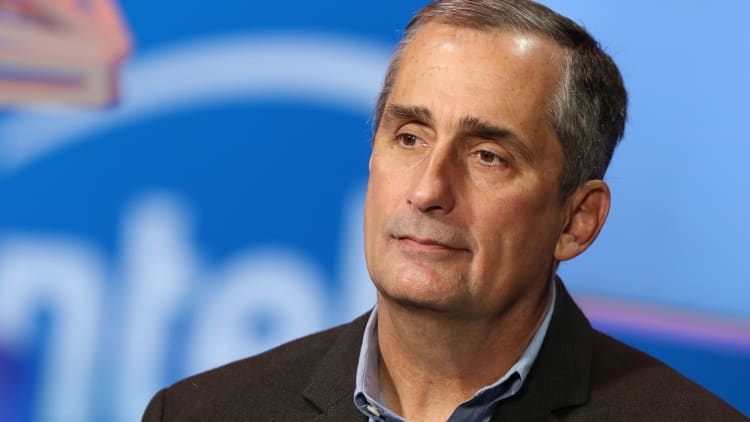
Intel stock rose more than 5.5 percent after the company released better-than-expected earnings for the fourth quarter of 2017 on Thursday. After the company's earnings call the stock was around 3.5 percent higher than the closing price of $45.30 per share.
- EPS: Excluding certain items, $1.08 in earnings per share vs. $0.86 in earnings per share as expected by analysts, according to Thomson Reuters.
- Revenue: $17.05 billion vs. $16.35 billion as expected by analysts, according to Thomson Reuters.
The company's total revenue for the quarter was up 4 percent year over year. And for the full year revenue came in at $62.8 billion, which was up 6 percent.
Intel's biggest segment, the Client Computing Group, brought in $9 billion, down 2 percent year over year, in the fourth quarter. But the second largest segment, the Data Center Group, grew 20 percent, with $5.6 billion in revenue. Both groups beat FactSet consensus estimates, which were $8.73 billion from the former and $5.09 billion from the latter, according to StreetAccount.
The company has faced pressure around its handling of the Meltdown and Spectre security vulnerabilities, which were disclosed on Jan. 3.
The issues affect chips made by several companies, although the Meltdown issue has had an especially large impact on Intel's processors. On Wednesday, a House committee said it had sent letters to Intel CEO Brian Krzanich and other tech leaders to learn about why Intel and other companies had withheld information about the issues for months before publicly announcing them.
Indeed, Intel acknowledged controversies related to the security issues in the forward-looking statements sections of the earnings report:
We have and may continue to face product claims, litigation, and adverse publicity and customer relations from security vulnerabilities and/or mitigation techniques, including as a result of side-channel exploits such as "Spectre" and "Meltdown," which could adversely impact our results of operations, customer relationships, and reputation. Separately, the publicity around recently disclosed security vulnerabilities may result in increased attempts by third parties to identify additional vulnerabilities, and future vulnerabilities and mitigation of those vulnerabilities may also adversely impact our results of operations, customer relationships, and reputation.
Intel had a one-time charge of $5.4 billion because of U.S. tax reform. Intel is expecting its tax rate to fall to 14 percent through 2018, and the company announced a 10 percent increase to its quarterly cash dividend that's tied to the tax changes.
In terms of guidance, for the first quarter of 2018 Intel said it's expecting $0.70 per share, give or take 5 cents, excluding certain items, on $15 billion in revenue, give or take $500 million. Analysts were expecting $0.72 per share, excluding certain items, on $15.03 billion in revenue, according to Thomson Reuters.
And for all of 2018, Intel said it's expecting $3.55 in earnings per share, plus or minus 5 percent, on $65 billion in revenue, plus or minus $1 billion. Analysts had been expecting $3.27 in earnings per share on $63.80 billion in revenue for the full year, according to Thomson Reuters.
"From a forecast standpoint, we actually made our forecast, and we've checked it as we go through the first few weeks here of the year against our prior forecast, to make sure the forecast incorporated any changes or any signs we're seeing of up or down," Krzanich said in response to a question about business impacts from the security issues on the earnings call. "I'd tell you, at the highest level, we're not seeing much of a change in those forecasts as a result of this. I'd tell you it's pretty balanced right now."
Later this year the company will come out with chips with silicon updates to protect against the Meltdown and Spectre issues, Krzanich said.
In the fourth quarter, Intel announced that it had hired the head of AMD's graphics business, Raja Koduri, and that it would begin making discrete graphics cards — an area where Nvidia is the market leader. Also, Krzanich sent employees a memo in which he said the company would take more risks.
Intel stock is down about 2 percent since the beginning of the year.


